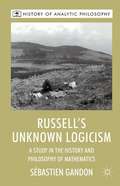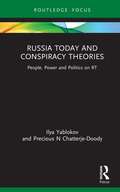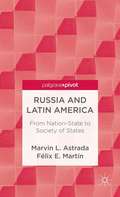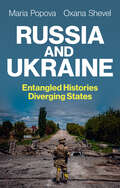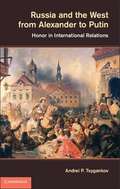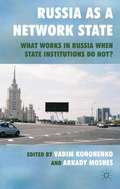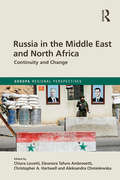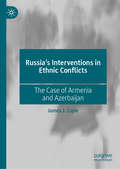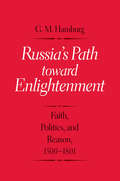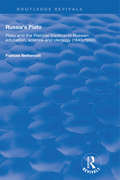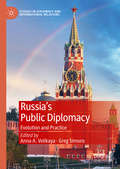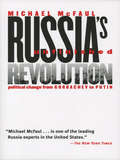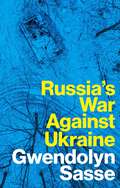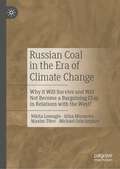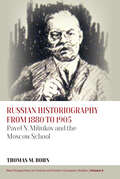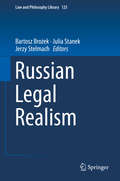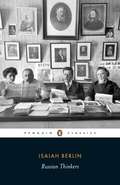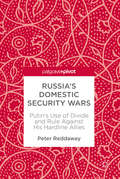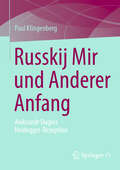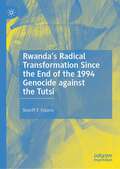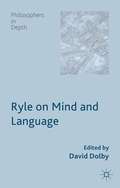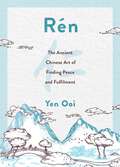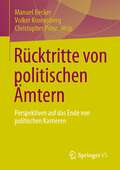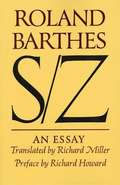- Table View
- List View
Russell’s Unknown Logicism: A Study in the History and Philosophy of Mathematics (History of Analytic Philosophy)
by Sébastien GandonIn this excellent book Sebastien Gandon focuses mainly on Russell's two major texts, Principa Mathematica and Principle of Mathematics, meticulously unpicking the details of these texts and bringing a new interpretation of both the mathematical and the philosophical content. Winner of The Bertrand Russell Society Book Award 2013.
Russia Today and Conspiracy Theories: People, Power and Politics on RT (Conspiracy Theories)
by Ilya Yablokov Precious N Chatterje-DoodyThe Russian international media outlet Russia Today (RT) has been widely accused in the Western world of producing government propaganda and conspiracy theories. This book explores for the first time the role that conspiracy theories actually play in the network’s broadcasts. More than this, it provides the first ever study of how the Russian government engages with conspiracy theories in the international arena, with a particular focus on the use of conspiracy theories as an instrument of public diplomacy. RT was established in 2005 to represent Russia to the world, and to present a Russian perspective on global events. Whilst some of RT’s more overtly conspiratorial output has been taken off the air, the network remains a source of significant concern for governments and intelligence agencies in Europe and North America. Now, more than ever, policymakers, journalists, academics, and intelligence services alike seek to understand the role RT plays in the Russian government’s foreign policy agenda. The authors use RT as a case study to investigate how global communication technologies influence the development and dissemination of conspiracy theories, which are also an important component of the post-Soviet Russian intellectual landscape and Kremlin-sponsored political discourse. This book will appeal to students and scholars of Politics and International Relations, Russian Studies, and Conspiracy Theories.
Russia and Latin America: From Nation-State to Society of States
by Marvin L. Astrada Félix E. MartínToday, extensive interconnected global processes provide non-state actors with a degree of agency that a 'System of States' paradigm cannot account for alone. Using Russia-Latin America relations as a case study and applying a Complex Adaptive Systems perspective, this work explores alternative international mechanisms of order and organization.
Russia and Ukraine: Entangled Histories, Diverging States
by Maria Popova Oxana ShevelIn February 2022, Russian missiles rained on Ukrainian cities, and tanks rolled towards Kyiv to end Ukrainian independent statehood. President Zelensky declined a Western evacuation offer and Ukrainians rallied to defend their country. What are the roots of this war, which has upended the international legal order and brought back the spectre of nuclear escalation? How did these supposedly “brotherly peoples” become each other’s worst nightmare? In Russia and Ukraine: Entangled Histories, Diverging States, Maria Popova and Oxana Shevel explain how since 1991 Russia and Ukraine diverged politically, ending up on a collision course. Russia slid back into authoritarianism and imperialism, while Ukraine consolidated a competitive political system and pro-European identity. As Ukraine built a democratic nation-state, Russia refused to accept it and came to see it as an “anti-Russia” project. After political and economic pressure proved ineffective, and even counterproductive, Putin went to war to force Ukraine back into the fold of the “Russian world.” Ukraine resisted, determined to pursue European integration as a sovereign state. These irreconcilable goals, rather than geopolitical wrangling between Russia and the West over NATO expansion, are – the authors argue – essential to understanding Russia’s war on Ukraine.
Russia and the West from Alexander to Putin
by Andrei P. TsygankovSince Russia has re-emerged as a global power, its foreign policies have come under close scrutiny. In Russia and the West from Alexander to Putin, Andrei P. Tsygankov identifies honor as the key concept by which Russia's international relations are determined. He argues that Russia's interests in acquiring power, security and welfare are filtered through this cultural belief and that different conceptions of honor provide an organizing framework that produces policies of cooperation, defensiveness and assertiveness in relation to the West. Using ten case studies spanning a period from the early nineteenth century to the present day – including the Holy Alliance, the Triple Entente and the Russia-Georgia war – Tsygankov's theory suggests that when it perceives its sense of honor to be recognized, Russia cooperates with the Western nations; without such a recognition it pursues independent policies either defensively or assertively.
Russia as a Network State
by Vadim Kononenko Arkady MoshesDiscusses the ambiguous nature of the state in Russia, focusing on elite networks and their role in policy processes. This book examines the paradoxical dualism of state institutions and ruling networks, providing answers as to why some decisions are not implemented, and why the state exists despite the systemic inefficiency of its institutions.
Russia in the Middle East and North Africa: Continuity and Change (Europa Regional Perspectives)
by Chiara LovottiAfter decades of intense interest and rivalry with the USA, the end of the Cold War and the dismantling of the USSR officially marked a period of significant retreat of Russia from the Middle East and North Africa (MENA). However, with Russia’s economic recovery and the entrenchment of President Vladimir Putin, Russia’s interest in the region has risen anew. Once again seen as a battleground to contest US hegemony, Russia has expanded its political, military and (to a lesser extent) economic relationships across the region. Most apparent in the military intervention in Syria, Russia has also been engaged with traditional rivals Iran, Saudi Arabia and Turkey, stepping into the vacuum left by the US Obama Administration. Is Russia’s reengagement part of a strategy, or is it mere opportunism? Authors with different backgrounds, experiences and origins examine this question via an analysis of the historical drivers of Russian interest in the MENA region and the factors underlying current Russian policies.
Russia's Interventions in Ethnic Conflicts: The Case of Armenia and Azerbaijan
by James J. CoyleThis book explores the thirty-year border conflict between Armenia and Azerbaijan, specifically around the former autonomous republic of Nagorno Karabakh, and shows how Russia is the only winner in this conflict: fighting on both sides, supplying arms to both sides, and acting as the arbiter between the two sides. The author looks at Armenia, Azerbaijan and the separatists from military, political, economic and diplomatic perspectives, and offers insights on how the fighting has influenced society, and vice versa. The book provides an update to the history of the war to include major fighting in 2020, and examines how Russia obtained three military bases and most economic assets in Armenia, while becoming Azerbaijan's major weapons supplier to the tune of six billion dollars. It shows how Russia has tried to sideline the internationally-supported Minsk negotiations in favor of Russia assuming the sole role of arbiter, and argues that even though Russia has submitted a number of ceasefire proposals, it does little to encourage the sides to implement them. The book includes a discussion of international law, United Nations Resolutions, and rulings by the European Court of Human Rights.
Russia's Path toward Enlightenment: Faith, Politics, and Reason, 1500-1801
by Gary M. HamburgThis book, focusing on the history of religious and political thinking in early modern Russia, demonstrates that Russia’s path toward enlightenment began long before Peter the Great’s opening to the West. Examining a broad range of writings, G. M. Hamburg shows why Russia’s enlightenment constituted a precondition for the explosive emergence of nineteenth-century writers such as Fedor Dostoyevsky and Vladimir Soloviev.
Russia's Plato: Plato and the Platonic Tradition in Russian Education, Science and Ideology (1840–1930) (Routledge Revivals)
by Frances NethercottThis title was first published in 2000. This work identifies the differences between the Russian intellectual approach to reading Plato and that of other European countries. This study offers a complex perspective on Russian philosophical learnings up to 1930. The book contains five chapters with the first aiming to provide the general institutional context in which Russian 19th century Plato scholarship developed, caught as it were, between the rise of the historical sciences and the heavy hand of state interference in standardizing the educational system in the name of nation building and modernization. The second chapter attempts to illustrate how Plato served as a reference in Russian philosophical culture and the third deals with aspects of Russian philosophy of law. In the fourth chapter, the author shifts his approach to compare and contrast a number of reactions to a single dialogue, the "Republic" and in the final concluding chapter, addresses the question of whether it is legitimate to speak of a Russian Platonism.
Russia's Public Diplomacy: Evolution and Practice (Studies in Diplomacy and International Relations)
by Greg Simons Anna A. VelikayaRussian public diplomacy attracts growing attention in the current global climate of tension and competition. However, it is often not understood or is misunderstood. Although some articles and book chapters exist, there are almost no books on Russian public diplomacy neither in Russian, nor in English. This edited collection is an in-depth and broad analysis of Russian public diplomacy in its conceptual understanding and its pragmatic aims and practice. Various aspects of Russian public diplomacy – from cultural to business practices – will interest professors, students and practitioners from various countries. Written by a diverse collection of the most prominent and capable scholars, from academia to international organizations, with a wealth of knowledge and objective experience, this book covers the vital topics and thoroughly analyzes the best practices and mistakes within the broad understanding of public diplomacy conducted by the Russian Federation.
Russia's Unfinished Revolution: Political Change from Gorbachev to Putin
by Michael McfaulFor centuries, dictators ruled Russia. Tsars and Communist Party chiefs were in charge for so long some analysts claimed Russians had a cultural predisposition for authoritarian leaders. Yet, as a result of reforms initiated by Mikhail Gorbachev, new political institutions have emerged that now require election of political leaders and rule by constitutional procedures. Michael McFaul--described by the New York Times as "one of the leading Russia experts in the United States"--traces Russia's tumultuous political history from Gorbachev's rise to power in 1985 through the 1999 resignation of Boris Yeltsin in favor of Vladimir Putin. McFaul divides his account of the post-Soviet country into three periods: the Gorbachev era (1985-1991), the First Russian Republic (1991-1993), and the Second Russian Republic (1993-present). The first two were, he believes, failures--failed institutional emergence or failed transitions to democracy. By contrast, new democratic institutions did emerge in the third era, though not the institutions of a liberal democracy. McFaul contends that any explanation for Russia's successes in shifting to democracy must also account for its failures. The Russian/Soviet case, he says, reveals the importance of forging social pacts; the efforts of Russian elites to form alliances failed, leading to two violent confrontations and a protracted transition from communism to democracy. McFaul spent a great deal of time in Moscow in the 1990s and witnessed firsthand many of the events he describes. This experience, combined with frequent visits since and unparalleled access to senior Russian policymakers and politicians, has resulted in an astonishingly well-informed account. Russia's Unfinished Revolution is a comprehensive history of Russia during this crucial period.
Russia's War Against Ukraine
by Gwendolyn SasseOn 24 February 2022, Russia launched a full-scale invasion of Ukraine, giving rise to the deadliest conflict on European soil since the Second World War. How could this happen in twenty-first-century Europe? Why did Putin decide to escalate Russia’s war against Ukraine, a war which began with Russia’s annexation of Crimea in 2014? In this timely book, Gwendolyn Sasse analyses the background to this war and examines the factors that led to Putin’s fateful decision. She retraces the history of Ukraine’s struggle for independence from Russia and shows how democratic developments in Ukraine had become a risk for Russia’s political system. She also shows that ambiguous Western policy towards Russia encouraged elites in the Kremlin to think that they had more room for action than they did. The result is a brilliant analysis of the background to the war, a concise account of the course of the war itself and a timely reflection on what its consequences will be – for Ukraine, for Russia and for the West. An indispensable book for anyone who wants to understand the most dangerous conflict of our time.
Russian Coal in the Era of Climate Change: Why it Will Survive and Will Not Become a Bargaining Chip in Relations with the West?
by Nikita Lomagin Maxim Titov Irina Mironova Michael OshchepkovThe Russian coal sector today faces challenges in the form of global decarbonization, sanctions, and difficulties in retaining market access and competitiveness. This new market environment warrants an examination of what lessons can be drawn from the past tribulations of one of Russia’s most iconic and strategically important industries. This book analyzes the Russian coal industry developments in historical and political contexts, including those of energy transition. The key tenets of contemporary dialogue between Russia and those who advocate for a speedy energy transition to phase out coal are presented. The book addresses the question of the coal industry as a sacrifice for the sake of Russia’s rapprochement with the West. The contribution of this book, therefore, is filling the gap between two large research inquiries – climate change mitigation and energy transition on the one hand, and the existing large coal industry of a given country on the other.
Russian Historiography from 1880 to 1905: Pavel N. Miliukov and the Moscow School (New Perspectives on Central and Eastern European Studies #6)
by Thomas M. BohnIn Russian historiography, the Moscow School’s paradigm shift from political and legal history to social and economic history was markedly driven by Pavel Miliukov (1859-1943), the late leader of the Constitutional Democrats and foreign minister of the Provisional Government. Russian Historiography from 1880 to 1905 develops a narrative of historical sociology’s advancement through the Moscow School under Miliukov’s influence and provides a window into his decision making as a political figure who based his leadership not on public opinion but on the effectiveness of historical processes.
Russian Legal Realism (Law and Philosophy Library #125)
by Bartosz Brożek Jerzy Stelmach Julia StanekThis edited volume explores ideas of legal realism which emerge through the works of Russian legal philosophers. Apart from the well-known American and Scandinavian versions of legal realism, there also exists a Russian one: readers will discover fresh perspectives and that the collection of early twentieth century ideas on law discussed in Russia can be understood as a unified school of legal thought – as Russian legal realism. <p><p> These chapters by renowned European and Eastern European legal philosophers add to ongoing discussions about the nature of law, especially in the context of developments around our scientific knowledge about the mind and behaviour. Analyses of legal phenomena carried out by legal realists in Russia offer novel arguments in favour of embracing psychological and sociological perspectives on the law. The book includes analysis of the St. Petersburg school of legal philosophy and Leon Petrażycki’s psychological theory of law. <p> This original and multifaceted research on Russian realists is of considerable value to an international audience. Researchers and postgraduate students of law, legal theory and legal ethics will find the book particularly appealing, but it will also interest those investigating the philosophy or sociology of law, or legal history.
Russian Thinkers
by Isaiah BerlinFew, if any, English-language critics have written as perceptively as Isaiah Berlin about Russian thought and culture. Russian Thinkers is his unique meditation on the impact that Russia's outstanding writers and philosophers had on its culture. In addition to Tolstoy's philosophy of history, which he addresses in his most famous essay, 'The Hedgehog and the Fox,' Berlin considers the social and political circumstances that produced such men as Herzen, Bakunin, Turgenev, Belinsky, and others of the Russian intelligentsia, who made up, as Berlin describes, 'the largest single Russian contribution to social change in the world.'
Russia’s Domestic Security Wars: Putin's Use Of Divide And Rule Against His Hardline Allies
by Peter ReddawayThe book is a case study of Putin’s use of the tactics of divide and rule in relation to, particularly, the hard-line elements among his supporters. It illustrates Putin's methods of staying in power vis-à-vis groups that might put too much pressure on him, or who might even try to oust him. The project also suggests that Putin’s survival tactics have brought Russia to a deeply corrupt, state-dominated form of authoritarianism, which lacks deep institutional roots and will probably lead in due course to some form of state collapse. This work will appeal to a wide audience including political scientists, academics, graduate students, and everyone who is interested in contemporary Russian politics.
Russkij Mir und Anderer Anfang: Alexander Dugins Heidegger-Rezeption als ontologische Rechtfertigung von Russlands kriegerischem Imperialismus
by Paul KlingenbergDie Arbeit befasst sich kritisch mit der Heidegger-Rezeption des Ideologen Aleksandr Dugin. Im Gegensatz zu anderen Interpretationen zeigt Klingenbergs Arbeit auf, dass Dugin ein profunder Kenner von Heideggers Werk ist, das sich auch durch Dugins Vermittlung als hochgradig anschlussfähig für den russischen Faschismus erweist. Zugleich kann eine Kritik dieser Rezeption zu einer Korrektur der in der westlichen Philosophie immer noch wirkmächtigen Apologie eines gewaltsamen, unrettbar mit dem Nationalsozialismus verstrickten Denkens beitragen. Von der „offiziellen“ oder besser gesagt ernstzunehmenden russischen Philosophie wurde Dugins ausführliche Darstellung von Heideggers Philosophie kaum beachtet oder als unseriös abgelehnt. Von daher ist es zu begrüßen, wenn hier eine Arbeit vorgelegt wird, die im Gegensatz zu einer weitgehend positiven Heidegger-Rezeption und -Interpretation in Westeuropa und auch in Russland, wo diese aufgrund der kulturpolitischen Situation in der Sowjetunion erst relativ spät einsetzt, eine Linie in Heideggers Denken aufzeigt, die dessen „völkische“ und latent nationalsozialistische Einstellung nicht als Verirrung oder zeitlich bedingte Einstellung bis zu seiner „Kehre“ einschätzt, sondern als einen Wesenszug seiner grundsätzlich antimodernen, im Grunde faschistischen Philosophie herausarbeitet. (Wolfgang Eismann)
Rwanda’s Radical Transformation Since the End of the 1994 Genocide against the Tutsi
by Sheriff F. FolarinThis book discusses the radical transformation of Rwanda, focusing on the dynamics of its society before and after the genocide against theTutsis in 1994. Through contextualizing the significant changes experienced by the country, it throws searchlights on a number of other African states facing similar challenges. The author analyses Rwanda's challenges of nationhood after the genocide; the vision and will of the country’s leadership; its social programs and strategies for cohesion and national development; the population’s resilience; and its growing regional influence in the twenty-first century. Rwandan society is here considered not only through the lens of existing literature on African politics, but also through direct engagement and fieldwork with local populations, scholars and policymakers. In addition, the book weighs in on narratives of survivors and victims of the genocide to understand and present local dispositions to current realities such as reforms, development plans, inclusive policies and programs, and determine how Rwandans deal with historical identity issues and conflicts. This book will be of interest to students, scholars and researchers interested in Rwandan and African politics, peace and conflict studies, security (strategic) studies, and genocide studies.
Ryle on Mind and Language
by David DolbyThis collection is devoted to Gilbert Ryle's philosophy of mind and language. It features essays from prominent scholars on the topics of category mistakes, hypotheticals, dispositions, emotion, thinking, perception, and the task-achievement distinction.
Rén: The Ancient Chinese Art of Finding Peace and Fulfilment
by Yen OoiA beautiful look at the Ancient Chinese philosophy of Rén and how it can help us with our hectic modern lives.The Chinese character for Rén ? combines the word for 'person' ?and the number 'two' ?, representing human connection. And in the teachings of ancient philosopher Confucius, Rén is the study of our relationship with those around us.In this accessible and beautiful book, Yen Ooi explains the various facets of Rén and explores how this philosophy applies to everything from our relationship with ourselves and the people in our lives, to how we relate to society and the wider world.She shows us how, using the basic principles of Rén and through simple changes to our lives, we can connect better with friends, family and colleagues, become helpful members of society and find fulfilment in ideas of community, justice, morality and compassion.
Rén: The Ancient Chinese Art of Finding Peace and Fulfilment
by Yen OoiA beautiful look at the Ancient Chinese philosophy of Rén and how it can help us with our hectic modern lives.The Chinese character for Rén ? combines the word for 'person' ?and the number 'two' ?, representing human connection. And in the teachings of ancient philosopher Confucius, Rén is the study of our relationship with those around us.In this accessible and beautiful book, Yen Ooi explains the various facets of Rén and explores how this philosophy applies to everything from our relationship with ourselves and the people in our lives, to how we relate to society and the wider world.She shows us how, using the basic principles of Rén and through simple changes to our lives, we can connect better with friends, family and colleagues, become helpful members of society and find fulfilment in ideas of community, justice, morality and compassion.
Rücktritte von politischen Ämtern: Perspektiven auf das Ende von politischen Karrieren
by Volker Kronenberg Manuel Becker Christopher PrinzPolitikwissenschaftliche und zeitgeschichtliche Untersuchungen zu den Karrieren deutscher Spitzenpolitiker*innen beschäftigten sich bislang vor allem mit deren Aufstieg und weniger mit dem Ende von politischen Laufbahnen. Aus welchen Gründen treten Politiker*innen aus dem Amt zurück? Was sind die Hintergründe, Motive und Konsequenzen einer solchen Entscheidung? Müssen Rücktritte zwingend Resultat eines Scheiterns sein oder kann es auch „erfolgreiche“ Rücktritte geben? In diesem Band werden theoretische Grundlagen der Rücktrittsforschung aus rechtlicher und politikwissenschaftlicher Perspektive erarbeitet, Rücktrittskulturen in unterschiedlichen Ländern vergleichend untersucht sowie verschiedene Fallbeispiele in ihren spezifischen Einzelfallbedingungen unter die Lupe genommen.
S/Z
by Richard Howard Roland Barthes Richard MillerPreface by Richard Howard. Translated by Richard Miller. This is Barthes's scrupulous literary analysis of Balzac's short story "Sarrasine. "
